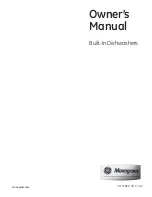
The detergent dispenser is located in the center of the
dishwasher door. It has two compartments. The main wash
compartment is found inside the detergent dispenser.
To open, press the button on the side of the dispenser.
The pre-wash compartment is on the lid of the detergent
dispenser. Use the pre-wash compartment only when your
water is extremely hard or when you have a heavy soiled
load. The pre-wash compartment is not used when tablet
or packet detergents are used.
NOTE:
Do not load large items in the lower rack where
they may block the wash jets from rinsing out the
detergent dispenser.
You may use tablet, packet, powder, liquid or gel automatic
dishwasher detergent. Make sure you use only detergents
specifically labeled for use in automatic dishwashers.
Never use liquid hand dish detergent in an automatic
dishwasher. Sudsing and poor wash performance will
result with the use of improper detergents.
Detergents should be stored in a dry location and in their
original container to prevent loss of effectiveness. Place
detergent in the cup just prior to starting the dishwasher
and then close the cover. The cover will open during the
wash cycle.
Filling the Detergent Dispenser
GE recommends using detergent in tablet or packet form.
Independent testing has shown this form of detergent is
very effective in the dishwasher.
Cascade
®
Platinum
Pacs
are an example of this type of detergent. Simply put
a tablet or packet into the main wash compartment and
slide to close the detergent cup cover. Please notice that
the tablet or packet must be placed in the main wash
compartment of the detergent cup. If the tablet or packet
is tossed in the bottom of the dishwasher, the detergent
will be flushed down the drain in a very short period of
time and will thus be wasted. Wash performance will be
very poor as a result.
If you choose to use detergent in powder, liquid or gel
form, the amount of detergent you use will be determined
by the hardness of your water, the temperature of your
water, and the food soil load inside the dishwasher.
Contact your water company to get information about
the hardness of the water in your area. Water hardness is
measured in grains per gallon. Use this information and
the table above to determine the amount of detergent
to use. You may purchase a hard water test strip
from GE. Call 1-877-959-8688 and ask for part number
WD01X10295
. In Canada, call 1-800-661-1616.
Using too much detergent with very soft and/or very hot water
may cause a condition called etching on your glassware.
Etching is a permanent cloudiness in your glassware. This
condition is irreversible. However, using too little detergent will
cause poor wash performance.
Use the table as a starting point and then adjust the amount
of detergent you use. Use just enough to get good wash
performance. Using just the right amount of detergent will
provide great wash performance without wasting detergent or
etching glassware.
DO NOT USE HAND DISH DETERGENT
NOTE:
Using a detergent that is not specifically designed
for dishwashers will cause the dishwasher to fill with suds.
During operation, these suds will spill out of the dishwasher
vents, covering the kitchen floor and making the floor wet.
Because so many detergent containers look alike, store the
dishwasher detergent in a separate space from all other
cleaners. Show anyone who may use the dishwasher the
correct detergent and where it is stored.
While there will be no lasting damage to the dishwasher, your
dishes will not get clean using a dishwashing detergent that is
not formulated for automatic dishwashers.
Number of
Grains/Gal.
Detergent Cups to Fill
Less than 4
Fill cup to 1/3 full
4 to 8
Fill cup to 2/3 full
8 to 12
Fill cup completely full
Greater than 12
Fill both main wash cup and pre
wash cup
Pre-Wash
Main
Wash
Rinse Agent
Detergent
Dispenser
Push/Slide
to Close
12
Using the Dishwasher
Dishwasher
Detergents
Summary of Contents for Built-In Dishwasher
Page 1: ...Owner s Manual Built In Dishwashers monogram com 49 55086 09 13 GE...
Page 13: ...13 Notes Dishwasher...
Page 28: ...28 Notes Dishwasher...
Page 29: ...29 Notes Dishwasher...
Page 30: ...30 Notes Dishwasher...
Page 31: ...31 Notes Dishwasher...
Page 32: ...32 Notes Dishwasher...













































